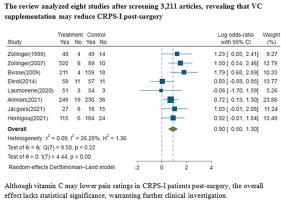Efficacy of vitamin C supplementation in preventing and treating complex regional pain syndrome type I (CRPS-I) in Orthopedic patients: A systematic review and meta-analysis
IF 1.5
Q3 NURSING
International Journal of Orthopaedic and Trauma Nursing
Pub Date : 2024-10-18
DOI:10.1016/j.ijotn.2024.101140
引用次数: 0
Abstract
Aim
Complex regional pain syndrome type I (CRPS-I) is a specific type of persistent pain which is often caused by fracture and surgery. There is no effective curative therapy available. However some studies have indicated that Vitamin C (VC) can reduce the incidence of CRPS-I. This study's objective is to investigate the effectiveness VC in preventing and treating CRPS-I.
Design
An Systematic review and Meta-analysis was done.
Data sources
Primary research studies from PubMed, Scopus, Web of Science, ProQuest, Embase database, and Cochran Library, and Google Scholar were reviewed. This search was conducted until March 27, 2024. This study was conducted without any language, place, and time restrictions. Study results were meta-analyzed with using effect sizes. To evaluate heterogeneity, we employed the Cochrane Q test and the I2 index.
Results
In our systematic review, 3947 articles were initially identified, with 3939 excluded for not meeting inclusion criteria, resulting in 8 studies being critically evaluated using Cochran's risk of bias checklist. The meta-analysis revealed that VC supplementation have effect on reducing CRPS-I post-limb surgery but this result shows that the pooled effect size is not statistically significant. The heterogeneity of the studies was low (I2 = 26.28%, p = 0.22). Publication bias was detected, indicating asymmetry in the funnel plot.
Conclusion
The results of our study showed the positive effect of VC supplementation in reducing the prevalence of CRPS-I after limb surgery.

维生素 C 补充剂在预防和治疗骨科患者 I 型复杂区域疼痛综合征 (CRPS-I) 方面的功效:系统回顾与荟萃分析。
目的:I 型复杂性区域疼痛综合征(CRPS-I)是一种特殊的持续性疼痛,通常由骨折和手术引起。目前尚无有效的治疗方法。不过,一些研究表明,维生素 C(VC)可以降低 CRPS-I 的发病率。本研究旨在探讨维生素 C 对预防和治疗 CRPS-I 的有效性:数据来源:PubMed、Medicast、Medicast、Medicast、Medicast、Medicast、Medicast、Medicast、Medicast、Medicast数据来源:对来自 PubMed、Scopus、Web of Science、ProQuest、Embase 数据库、Cochran Library 和 Google Scholar 的原始研究进行了审查。该搜索一直持续到 2024 年 3 月 27 日。本研究不受任何语言、地点和时间限制。我们使用效应大小对研究结果进行了荟萃分析。为了评估异质性,我们采用了 Cochrane Q 检验和 I2 指数:在我们的系统综述中,初步确定了 3947 篇文章,其中 3939 篇因不符合纳入标准而被排除,结果有 8 项研究使用 Cochran 的偏倚风险清单进行了严格评估。荟萃分析表明,补充 VC 有助于减轻肢体手术后 CRPS-I 的症状,但这一结果表明,汇总效应大小在统计学上并不显著。研究的异质性较低(I2 = 26.28%,P = 0.22)。研究发现了发表偏倚,显示漏斗图不对称:我们的研究结果表明,补充 VC 对降低肢体手术后 CRPS-I 的发病率有积极作用。
本文章由计算机程序翻译,如有差异,请以英文原文为准。
求助全文
约1分钟内获得全文
求助全文
来源期刊
CiteScore
2.60
自引率
14.30%
发文量
34

 求助内容:
求助内容: 应助结果提醒方式:
应助结果提醒方式:


